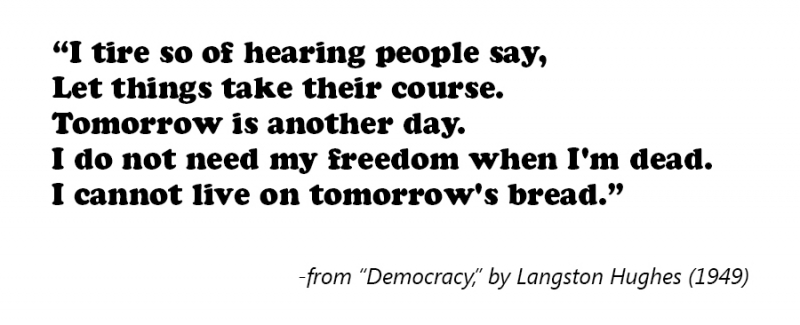This post was written by NCTE members Nicole Mirra and Antero Garcia, Guest Editors of Research in the Teaching of English for a special issue, “Freedom Is a Strong Seed: Transforming Civics through English Language Arts.”
Democracy will not come
Today, this year
Nor ever
Through compromise and fear.I have as much right
As the other fellow has
To stand
On my two feet
And own the land.I tire so of hearing people say,
Let things take their course.
Tomorrow is another day.
I do not need my freedom when I’m dead.
I cannot live on tomorrow’s bread.Freedom
Is a strong seed
Planted
In a great need.I live here, too.
I want freedom
Just as you.Langston Hughes (1949)
Watch more in “Democracy” by Langston Hughes.
Educators, youth, and communities are navigating yet another civic season of “great need,” stalked by the interlocking threats of resurgent fascist ideologies, racist, homophobic, and transphobic violence, climate disaster, public health crisis, and economic inequity. Literacies can be “seeds of freedom” in today’s world, carrying the potential to combat the perpetuation of each of these existential threats.
But as Langston Hughes reminds us, cultivation of these seeds cannot occur if we delay or succumb to “compromise and fear.” For the literacy community, such fear can manifest as passivity in the face of curriculum bans. Or stifling discussions of identity and sociopolitical topics in the classroom. Or the embrace of neoliberal fallacies of “neutrality.” Or rejecting civic learning as a core element of our discipline. Our youth cannot live on “tomorrow’s bread.”
This special issue of Research in the Teaching of English (RTE) solicits research that examines how the knowledges, skills, and commitments of English language arts can explode the traditional paradigm of “civic education” and in its place build creative and liberatory possibilities for civic praxis in classrooms and communities. We seek scholarship that pushes beyond sociopolitical critique toward civic creation. We seek scholarship in which theoretical frameworks, methodologies, and presentation of findings embrace relationality, mutual exchange, and joy, and in which understandings of the “civic” are expansively defined.
Submissions for this issue might address the following topics:
- Youth counternarratives of civic life and learning
- The role of literacies in the development of classroom or community counter-publics
- Praxis of participatory action collectives and/or social design-based experiments involving educators, communities, and/or youth
- Educational interventions grounded in futurist theorizing (e.g., Afro-, Latinx, Indigenous, queer, eco, disabled/crip futurisms)
- Speculative civic literacy learning in formal and informal educational environments
- Transnational perspectives on civic community and engagement
- Analysis of Inter/transdisciplinary classroom civic literacy projects
- Critical political engagement in and beyond the ELA classroom
- Seeding civic commitments within pre-service and in-service educator professional learning programs
- The affordances of multimodality in the development of civic futures
Submissions from early career and/or underrepresented scholars are encouraged, as are those written in collaboration with youth, educators, and/or community members.
The timelines and deadlines are:
- November 30, 2023 – Abstracts due
- December 15, 2023 – Accepted authors notified
- June 1, 2024 – Manuscripts due
- September 1, 2024 – Reviews/Revision requests returned to authors
- November 1, 2024 – Revised manuscripts due
For consideration for this issue, please send a 500-word abstract of your proposed manuscript to: nicole.mirra@gse.rutgers.edu and antero.garcia@stanford.edu.
Please note: your submission will need to adhere to the guidelines provided by RTE here.
 Nicole Mirra is an associate professor of urban teacher education in the Department of Learning & Teaching at the Rutgers University Graduate School of Education. She previously taught secondary literacy and debate in Brooklyn, New York, and Los Angeles, California. Her work utilizes participatory design methods in classroom, community, and digital spaces to collaboratively create civic learning environments with youth and educators that disrupt discourses and structures of racial injustice and creatively compose liberatory social futures. Her books include Educating for Empathy: Literacy Learning and Civic Engagement, Doing Youth Participatory Action Research: Transforming Inquiry with Researchers, Educators, and Students (coauthored with Antero Garcia and Ernest Morrell), and Civics for the World to Come: Committing to Democracy in Every Classroom (coauthored with Antero Garcia).
Nicole Mirra is an associate professor of urban teacher education in the Department of Learning & Teaching at the Rutgers University Graduate School of Education. She previously taught secondary literacy and debate in Brooklyn, New York, and Los Angeles, California. Her work utilizes participatory design methods in classroom, community, and digital spaces to collaboratively create civic learning environments with youth and educators that disrupt discourses and structures of racial injustice and creatively compose liberatory social futures. Her books include Educating for Empathy: Literacy Learning and Civic Engagement, Doing Youth Participatory Action Research: Transforming Inquiry with Researchers, Educators, and Students (coauthored with Antero Garcia and Ernest Morrell), and Civics for the World to Come: Committing to Democracy in Every Classroom (coauthored with Antero Garcia).
 Antero Garcia is an associate professor in the Graduate School of Education at Stanford University. His research explores the possibilities of speculative imagination and healing in educational research. Prior to completing his PhD, Garcia was an English teacher at a public high school in South Central Los Angeles. His recent research explores learning and literacies in tabletop roleplaying games like Dungeons & Dragons and the civic learning possibilities in various learning environments. Based on his research, Garcia co-designed the Critical Design and Gaming School—a public high school in South Central Los Angeles. His recent books include All through the Town: The School Bus as Educational Technology, Everyday Advocacy: Teachers Who Change the Literacy Narrative (coauthored with Cathy Fleischer), and Civics for the World to Come: Committing to Democracy in Every Classroom (coauthored with Nicole Mirra). Garcia currently coedits La Cuenta, an online publication centering the voices and perspectives of individuals labeled undocumented in the US: https://lacuenta.substack.com.
Antero Garcia is an associate professor in the Graduate School of Education at Stanford University. His research explores the possibilities of speculative imagination and healing in educational research. Prior to completing his PhD, Garcia was an English teacher at a public high school in South Central Los Angeles. His recent research explores learning and literacies in tabletop roleplaying games like Dungeons & Dragons and the civic learning possibilities in various learning environments. Based on his research, Garcia co-designed the Critical Design and Gaming School—a public high school in South Central Los Angeles. His recent books include All through the Town: The School Bus as Educational Technology, Everyday Advocacy: Teachers Who Change the Literacy Narrative (coauthored with Cathy Fleischer), and Civics for the World to Come: Committing to Democracy in Every Classroom (coauthored with Nicole Mirra). Garcia currently coedits La Cuenta, an online publication centering the voices and perspectives of individuals labeled undocumented in the US: https://lacuenta.substack.com.
It is the policy of NCTE in all publications, including the Literacy & NCTE blog, to provide a forum for the open discussion of ideas concerning the content and the teaching of English and the language arts. Publicity accorded to any particular point of view does not imply endorsement by the Executive Committee, the Board of Directors, the staff, or the membership at large, except in announcements of policy, where such endorsement is clearly specified.

